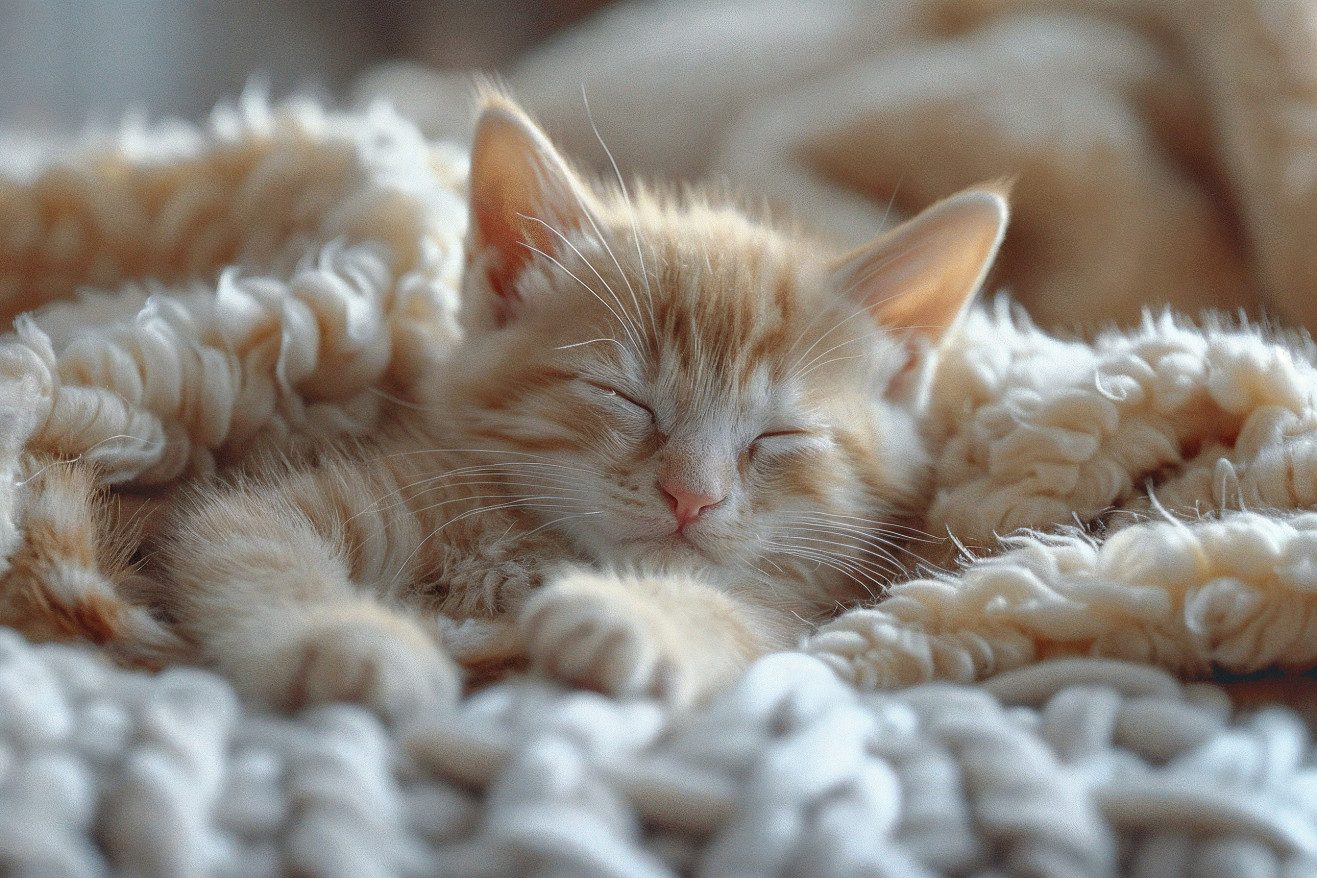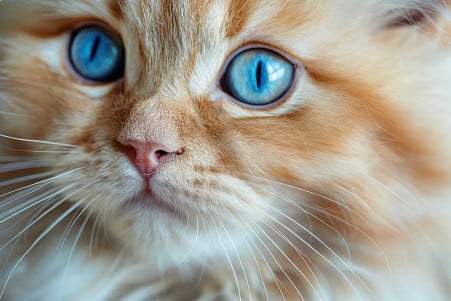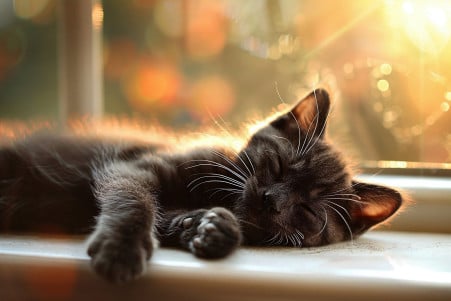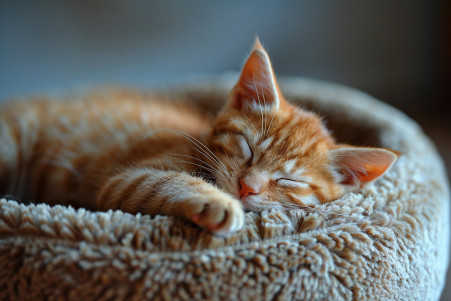How Long Does It Take for Kittens to Open Their Eyes? A Look at Kitten Vision
19 May 2024 • Updated 17 May 2024

How long does it take for kittens to open their eyes and see the world around them? Newborn kittens are born with their eyes closed and their vision doesn't start to develop until they're 7-10 days old. After that, their eyes will open over the next 1-2 weeks as their visual system matures, and by the time they're 2 weeks old, their eyes will be fully open and they can see the world around them.
To learn more about the biological process that leads to a kitten's vision, let's look at veterinary studies that have investigated the anatomical changes that take place in a kitten's eyes during the first few weeks of their life. These studies have provided details about the exact timing and processes that enable kittens to open their eyes and see clearly. This article will give you an understanding of this natural process as their vision develops.
How long does it take for kittens to open their eyes?
The Biology of a Kitten's Vision Development
When kittens are born, they are much less developed than many other animals. For example, deer are born with their eyes open and the ability to walk and run within hours of birth, but kittens are born with their eyes and ear canals closed, which means their senses are not yet fully formed. This is to protect their eyes and ears from potential harm during the first few weeks of life.
Instead of opening all at once, a kitten's eyes open over the course of 7-12 days, which allows their visual system to develop and adjust to light and sound as their eyes open. As veterinary research from PetMD explains, if a kitten's eyes are exposed to bright light or their ears are exposed to loud noises before their visual and auditory systems are fully developed, it could lead to permanent damage.
By the time they've gone through this important stage of development during their first 4 weeks of life, kittens will have developed their senses of sight, hearing and other important systems well enough to support them as they continue to grow. The initial closed state of their eyes and ears ensures they are protected until their visual and auditory systems are ready to handle the outside world. This way, they are well-prepared to experience the world with fully developed vision, hearing and other senses by the time they reach their 1-month birthday.
How to Monitor a Kitten's Eye Development and Potential Problems
Kittens' eyes should open at the same time, with both eyes fully open and dilated by 2 weeks of age. The Rivergate Veterinary Clinic notes that if one eye opens before the other or if the eyes have not opened by 16 days, there may be cause for concern.
Common eye issues in kittens include infections, conjunctivitis, injuries, and light sensitivity. WagWalking explains that symptoms like swelling, crustiness, redness, and squinting should be evaluated by a veterinarian as soon as possible. Ophthalmia neonatorum is a common eye infection that can cause swelling, discharge, and damage to the eye if it is not treated.
It is important to monitor kittens' eyes closely and make sure to address any issues as soon as they arise to protect their developing vision. The National Kitten Coalition explains that kittens with eye infections or other eye issues need to be seen by a veterinarian right away and will often be treated with antibiotics and antivirals. In addition, the infected kitten and its littermates should be isolated to prevent the infection from spreading.
What to Do When You Have Newborn Kittens That Haven't Opened Their Eyes Yet
Newborn kittens need special care for the first 1-2 weeks of their lives before their eyes open. WebMD explains that it's important to keep the kittens in a warm, quiet, draft-free area that's away from bright light and loud noises. If the kittens are orphans or have been rejected by their mother, they will need to be fed every 2-3 hours with kitten milk replacer since they can't eat solid food yet.
The Perfect Fit™ website says that kittens under 4 weeks old can't go to the bathroom on their own, so you'll need to help them urinate and defecate by gently stimulating them after each feeding until they're old enough to be litter trained. You'll also need to keep their faces clean by gently wiping them with a warm, damp cloth, but never try to open their eyes.
This care is important during this pre-eye-opening period to help the kittens get to the next stage in their development, which is the opening of their eyes and the development and potential problems of their eyes.
How to Treat Eye Infections in Newborn Kittens
Ophthalmia neonatorum is a common eye infection that occurs in the first few weeks of a kitten's life. PetMD states that this condition is caused by bacteria or viruses that are often picked up during birth, and it results in inflammation, discharge, and damage to the eye. Symptoms include sneezing, eyes that are crusted over or filled with pus, squinting, and eyes that are sealed shut due to swelling.
Immediate medical care is needed, and treatment typically involves antibiotics, antivirals, and cleaning the eyes. The National Kitten Coalition notes that neonatal ophthalmia can be caused by infections such as feline chlamydiosis and feline herpesvirus. In these cases, a vet will need to separate the kitten from the litter, open the eyes if they have sealed shut, flush the eyes, and prescribe both topical and oral medications.
It's important to separate the infected kitten and its littermates until the kitten has been treated and is no longer contagious. This is because PetMD points out that these eye infections are highly contagious. It's also important to treat any eye infections as soon as possible to protect a kitten's developing eyesight and prevent long-term damage.
How to Promote Good Vision in Growing Kittens
Once kittens open their eyes, it’s important to continue to provide the right care to promote the ongoing development of their vision. The Rancho Village Veterinary Hospital notes that it’s important to make sure that kittens aren’t exposed to bright light that could potentially harm their eyes, which are still developing.
One of the most important things to do is to make sure that kittens are taken to the vet for regular check-ups so that any potential problems can be caught and treated early. The International Cat Care organization also recommends making sure that kittens are in an enriched environment that encourages them to use their eyes to explore the world around them, especially since their depth perception won’t be fully developed until they’re about 4 weeks old.
In addition, making sure that kittens are up-to-date on their vaccinations and other preventive care will help ensure that their eyes are protected throughout their lives. The Pittsboro Vets website also notes that it’s important to make sure that kittens are kept clean and that any eye infections are treated promptly to make sure that they don’t come back or spread to other kittens in the litter.
With the right care, kittens’ eyes will continue to develop so that they can see well as they grow into adulthood. And, by understanding these early developmental milestones, cat owners can develop an even deeper bond with their pets.
Conclusion: Understanding a Kitten's Senses
The stages of eye opening are just one example of the many ways that kittens' senses develop during their first few weeks of life. The fact that kittens are born with their eyes and ears closed is a protective measure that gives their sensory systems time to adjust to the outside world. However, it's important to make sure that kittens receive the care they need and that they are monitored closely during this time.
By doing so, pet parents can help ensure that their kittens grow up to be healthy cats with good vision and other senses. Understanding and celebrating these early milestones can also help pet parents feel more connected to their kittens.


